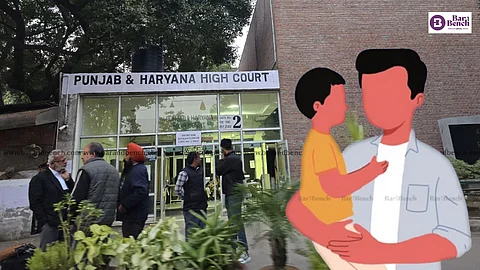
- Latest Legal News
- News
- Dealstreet
- Viewpoint
- Columns
- Interviews
- Law School
- Legal Jobs
- हिंदी
- ಕನ್ನಡ

The Punjab and Haryana High Court recently held that a man's right to privacy cannot override the right of a child to know the identity of his father.
Justice Archana Puri passed the ruling while dismissing a revision petition that had challenged a trial court’s decision to allow a child’s plea for the comparison of his DNA sample with that of a man he claims to be his father.
“Justice to this child/plaintiff, is a factor, not to be ignored. Rather, his assertion demands that truth be known, when truth has to be established, as it undoubtedly can. Simultaneously, the right of defendant No.1 [man claimed to be father] to privacy and dignity, also has to be taken into consideration. However, the right of privacy, as such, cannot override the right of the child and vest interest in his favour,” the Court said.
However, the High Court added that the trial court's directive to allow the use of police force to ensure that there is no resistance by the defendant when his DNA sample is taken, was unnecessary.
The case has its origins in a maintenance plea filed under Section 125 of Code of Criminal Procedure (CrPC) by a minor through his mother. The defendant-man had denied having fathered the child, leading to filing of a suit for declaration that he is the father.
The child submitted that his mother had come in contact with the man in 1988 as a tenant in his house. With the passage of time, they had developed a relationship, it was claimed. The child was born in 1990.
However, the man, in response argued that the child was not his but of the woman and her previous husband, whom she had divorced in 1994. Considering the material on record, the trial court in 2015 allowed the application for a DNA test.
The man (petitioner) then moved the High Court, arguing that since the child was born during the subsistence of his mother’s marriage, Section 112 of the Indian Evidence Act would be applicable.
The provision provides that birth of a child during the subsistence of a marriage between his mother and a man, shall be conclusive proof that he is a legitimate son of that man, unless it can be shown that the married couple had no access to each other.
The Court observed that the presumption is directed towards safeguarding the interest of the child protecting from gaining the status of ‘bastard’. However, it added, the present case is different and that Section 112 would not apply.
On various decisions holding that DNA tests should not be ordered in a routine manner, the Court said those rulings relate to instances when a partner of a subsisting marriage denies the parenthood of a child.
“The rationale laid down in the decisions aforesaid, where it was one partner of the marriage, who resisted the parenthood, in any manner, would not apply, where a child on attaining adulthood moves to the Court to assert his paternity. In that eventuality, application of Section 112 of the Indian Evidence Act does not arise,” it ruled.
The Court noted that the child in the present case has come forth asserting that the petitioner is his father. It added that the child’s mother has also backed his claim.
“[The] presumption under Section 112 of the Indian Evidence Act, would not arise, when impliedly, additional access of the mother of the plaintiff, at the relevant time of begetting of the plaintiff, at the behest of defendant No.1, is asserted,” the Court said.
It added that the child is well aware of the consequences of the DNA test - that it may downsize his position and that of his mother in the society. Despite this, they sought the DNA test, which was factored by the Court while ruling in their favour.
“Even, mother of the plaintiff is of mature age and she is bound to be well aware of the consequences of the action of her son and his claim qua the paternity issue. They having come forward unhesitatingly has to be considered,” the Court said.
The Court also remarked that if the petitioner and the child are strangers in any manner as asserted, no injustice would happen to the man by conducting the test.
“Rather, if he is father, his position will be put beyond doubt by the testing and the paternity as pleaded shall be ascertained. Why there should be any hesitation to undergo this test is not coming forth. Of course, the evidence is to be led by both the sides, but the question arises, when the paternity can be affixed by surer test, then why decision based on legal presumption or gathering of inference, on the basis of the evidence or any gap, on account of misjudgment, be left. Considering all these aspects, this test will surely assist the Court to reach the right conclusion, vis-a-vis, relationship between the parties concerned. That being so, it ought to be undertaken,” it added.
Thus, the Court dismissed the man’s revision plea but clarified that no force is to be used to procure his DNA sample.
It added that the trial court should record its inference in accordance with the man's decision on this issue.
“In the eventuality of any disinclination, on the part of defendant No.1 and the reason therefor, to be recorded by the trial Court, shall be appraised by the trial Court, at appropriate stage, in the backdrop of the other evidence, brought on record,” it said.
Advocates Akshay Jindal and Vijayveer Singh represented the petitioner.
Advocates Nandan Jindal and Aniket Singh represented the respondents.